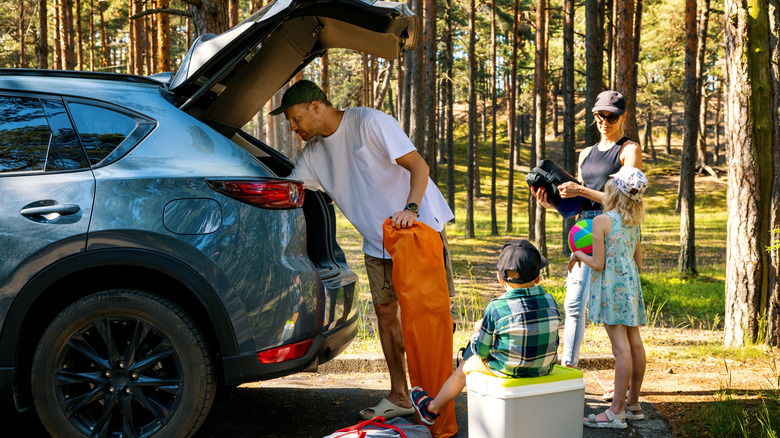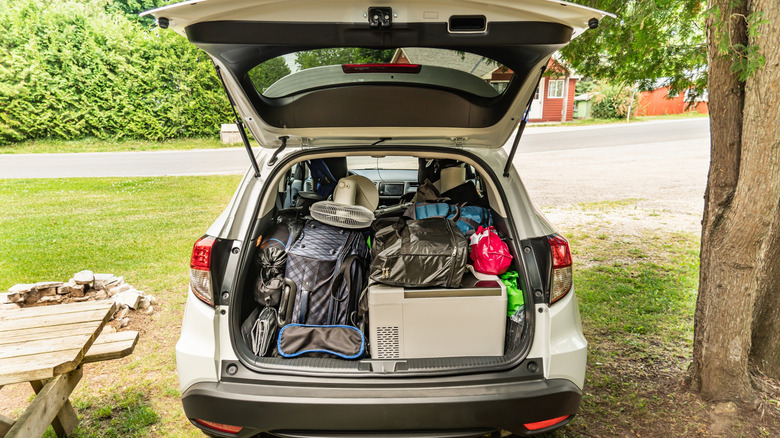The Unexpected Downsides To Camping In A Car
In an era when screens dominate our lives, the call of the wild grows ever louder. Spending time in nature offers a refreshing escape, one that boosts our physical and mental well-being. Studies show that immersion in natural settings can improve sleep, reduce stress, and enhance emotional health by providing us with a break from the onslaught of highly urbanized areas. Camping, particularly car camping, offers an economical way to reconnect with nature and feel its positive effects. From state parks to bucket list worthy national parks, accessible campsites are available to all, making it easy to drive right up to nature's embrace.
Car camping, defined as driving your vehicle directly to a campsite and also likely sleeping inside it, blends convenience with the great outdoors. Unlike tent camping, where you pitch a tent on a designated pad, car camping lets you use your vehicle as accommodation, providing accessibility and the ability to haul more gear than backpacking.
Just make sure you know the difference between a 'walk-in' and a walk-up' campsite. No need to invest in a tent, and sleeping in the car might provide a sense of security not found in tents. Locked doors provide a peace of mind that a tent's flimsy fabric can't. A bear might horrifically shred a tent, but a car feels like a fortress. Plus, you can keep all your essentials close, and in a pinch, slide into the driver's seat for a seamless getaway. Cars also shield campers from extreme elements like rain or wind, marrying nature with creature comforts of a home. But before romanticizing this setup, there are some unexpected downsides to car camping that might dim the fire's glow.
The downsides of car camping
Car camping's appeal — convenience and security — can come with trade-offs that catch first-timers off-guard. Space is a big one. Your trusty sedan might not accommodate you, your partner, and your 70-pound furry friend comfortably. Unlike a tent, which can be easily sized up or down, cars have pretty fixed dimensions. Fully reclining might not even be possible, leaving you cramped and restless. This lack of flexibility can make car camping feel less like an adventure and more akin to a night stuffed into a metal box like a sardine.
Then there's the disconnect from nature. Sleeping in a car creates a barrier between you and the elements, muffling the river's rush or the dawn chorus of birds — those sensory details that make camping restorative and delightful. The very safety that draws some to car camping can leave you feeling isolated from the natural environment. You might wake up wondering if you're truly "camping" or just parking somewhere green.
Over-packing can be another pitfall. Since you can load the car with all the luxuries without the need to hike anything miles deep into the backcountry, it's tempting to toss in everything but the kitchen sink and transform your trip into a glamping experience. This can lead to time-consuming packing and unpacking, severely eating into the time for relaxing. Worse yet, crowded campsites can amplify the feeling of not escaping civilization. With outdoor recreation booming, you might end up next to noisy neighbors blasting music until 3AM or an RV's noisy generator buzzing throughout the trip (thanks California for banning them). A glaring nearby light or squeaky doors can further disrupt the peace and serenity, making you question if car camping delivers the nature fix you craved.
Tips for a fabulous car camping trip
To make car camping a delight, a little preparation can go a long way. For beginners, the logistics — gear, packing, reserving a campsite — can feel daunting. Start by streamlining your process. Book campsites in advance through platforms like Recreation.gov, aiming for spots away from bathrooms to avoid light and noise. Create a checklist covering all the essentials: layers, a cookstove with fuel, fire-starting tools, a first-aid kit, toilet paper, a headlamp, trash bags, and a water jug. Keep meals simple — think one-pot dishes — to save time and clean up.
For sleeping, position your head toward the front of the vehicle to avoid wrestling the steering wheel for leg room. Crack windows slightly to prevent condensation, and use window coverings for privacy and insulation while blocking early morning light. Storage boxes keep gear organized; the more you pack, the harder it is to find that headlamp when nature calls and it's dark. Before heading out, inspect your vehicle and pack a basic roadside emergency kit — better safe than stranded.
These steps can help you focus on the joys of car camping: the starry skies, the crackle of a campfire, the cradle of the forest, and the serenity that comes from escaping the buzz of the city. Car camping isn't perfect, but with the right approach, it can be a gateway to nature's medicinal embrace.


